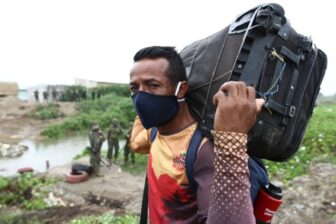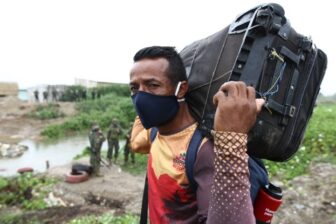BOGOTÁ – The pandemic has prompted many in the global business community to embrace a future where they do well by doing good. But in conflict-prone places like Colombia, there are signs companies will increasingly be held accountable for wrongdoing in the past – and present.
Colombia’s prosecutor general recently accused executives at Drummond, a global coal producer, of links to paramilitaries who assassinated union leaders nearly 20 years ago – one of the highest-profile cases of alleged human rights violations by a company in a conflict zone. The case can mean potential jail time for senior executives if they are found guilty, a first in this war-torn nation. (Drummond has denied its executives have ever had links to armed actors, and has offered to cooperate with the authorities.)
After more than 50 years of armed conflict, Colombia is no stranger to the co-mingling of business and war. Back in 2003 Chiquita Brands admitted to the U.S. Department of Justice that it paid off Colombian armed groups for years to ensure the safety of its operations and its people. Elsewhere in Latin America, companies including Volkswagen have faced scrutiny for their alleged support of 20th century dictatorships in Brazil and Argentina. But recent political developments suggest that corporate wrongdoing will come under more aggressive scrutiny in Colombia and in the rest of the region in years to come.
For starters, Colombia has created a transitional justice system, known as JEP, on the back of a 2016 peace accord with Marxist guerrillas, which is meant to unearth crimes committed by armed actors and their backers. Former guerrillas and right-wing paramilitaries are seeking leniency from JEP judges in exchange for admitting guilt and denouncing their former paymasters, even if these include companies that were victims of extortion.
Leftist politicians with an eye on Colombia’s 2022 presidential elections are also looking to hold corporations more accountable. The left is demanding justice for thousands of conflict victims, many of whom lost family members or were displaced from land later acquired by companies. What’s more, politicians have become increasingly hostile to extractive companies, which they accuse of fueling the armed conflict for decades. Oil and mining are not alone in the political crosshairs: A database created by academics from the political science department of the Javeriana University lists dozens of local and foreign companies, including cattle raising and food and beverage producers, for alleged human rights abuses.
Even what is considered legal is coming under scrutiny. Multinational companies operating in Colombia continue to strike financing deals with the police, the military and the prosecutor’s office in exchange for protection from criminals, armed actors and activists who sabotage their operations. These controversial accords remain legal for now, but journalists and NGOs have repeatedly denounced them for fostering corruption within the security forces, and for possibly underwriting the killing and intimidation of activists and community leaders.
A few companies are beginning to more earnestly assess their conflict footprint risk, and have sought advice on best practices going forward. But many company executives still have their heads stuck in the sand. They dislike the idea of digging into their past and like to think that business-friendly politicians will give this whole issue a pass. Companies also believe that being held accountable in a court of law remains unlikely. But in a world focused on fixing environmental, social and governance wrongs, this is a dangerous underestimation of legal and reputational risks ahead.
U.S. courts will continue to field lawsuits on behalf of those impacted by armed conflicts or environmental degradation in a host of countries. The U.S., the UK, the European Union, and international agencies will demand that companies perform increasingly complex human rights due diligence. The European Parliament is already working on a law that would hold corporations accountable for the harm they may cause people and the environment globally.
Human rights lie at the core of U.S. President Joe Biden’s foreign policy, which means the U.S. will continue to pressure countries like China, Myanmar, and Colombia to show progress on these fronts, including addressing corporate wrongdoing brought about in cahoots with the military or armed actors. Non-compliance will likely mean biting sanctions, a reduction in aid packages or fines for companies.
A harbinger of change is that politically conservative financial markets are aligning with left-leaning activists on human rights issues. Credit rating agencies are incorporating social and environmental considerations into the credit scores of sovereign and corporate bonds, which means lenders and markets will become increasingly sensitive to human rights abuses by governments and companies. A recent working paper by the University of Oxford’s Nathan Lane has shown that human rights accusations can already cut a company’s market valuation by an average of $100 million.
The pandemic is becoming an accelerant of a global effort to redress past wrongs. Companies who want to contribute solutions and survive in a post-pandemic world will have to take a good hard look internally first, before governments, regulators and a new generation of consumers embrace them as legitimate agents of change.
—
Gallegos is a political and reputational risk advisor for Control Risks







